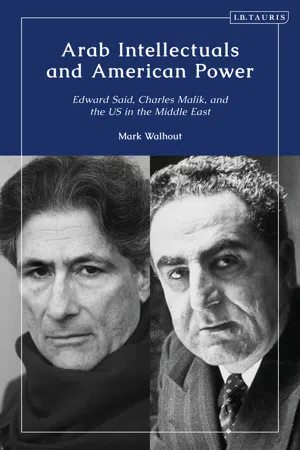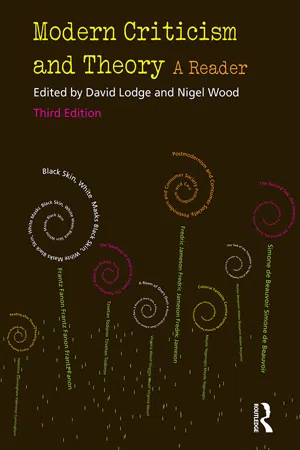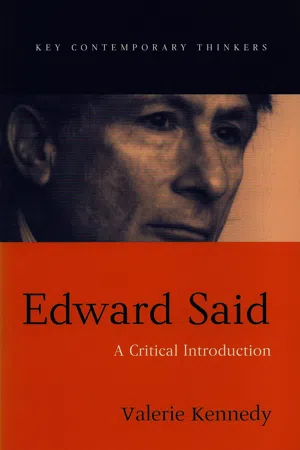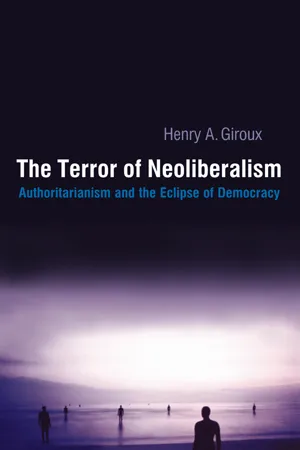Edward Said
Edward Said was a Palestinian-American literary theorist known for his influential work "Orientalism," which critiqued Western representations of the East as a means of asserting power and dominance. He argued that these representations were not objective but rather served political and ideological purposes. Said's work has had a profound impact on postcolonial studies and continues to shape discussions on power, representation, and identity.
8 Key excerpts on "Edward Said"
- eBook - ePub
- Peter Childs, Patrick Williams(Authors)
- 2014(Publication Date)
- Routledge(Publisher)
...Chapter 3 Said: knowledge and power Introduction Edward Said is one of those individuals who seem permanently to occupy an embattled, and to their way of thinking principled, kind of middle ground. (Others would include George Orwell and Albert Camus - the latter a comparison which Said might or might not welcome.) In his life and works generally, Said is for some far too political, given his frequently outspoken stance on Palestine, while for others he is not politically involved enough (for instance, ironically, in the question of Palestine). In his more academic writing, Said is, especially in the heavily theoretically inflected world of contemporary literary and cultural studies, sometimes regarded as rather superficial or opportunistic in his use of theory, while for many conservative colleagues he is a perfect illustration of those senior figures who, leading by example, have surrendered the study of literature to the excesses of wild theorists. Similarly, while some people wished that his 1993 Reith Lectures, ‘Representations of the Intellectual’, had been more challenging, for the Daily Telegraph they represented a scandalous attempt to blame all the ills of the world on the West. In the post-colonial field, although some would try to separate his writings, thereby producing an academic Said, author of Orientalism, The World, the Text and the Critic, and Culture and Imperialism, and a politically engaged Said, author of The Question of Palestine, Covering Islam, After the Last Sky, Blaming the Victims, and The Politics of Dispossession, 1 Said himself would strenuously resist such a division, not least since it in one way replicates precisely the kind of compartmentalizing and (over-)specialization which, in his eyes, bedevil intellectual work in general, and this area in particular...
- eBook - ePub
Postcolonial Theory
A critical introduction
- Leela Gandhi(Author)
- 2020(Publication Date)
- Routledge(Publisher)
...4 Edward Said and his critics The principal features of postcolonialism’s intellectual inheritance—which we covered in the preceding two chapters—are realised and elaborated in Edward Said’s Orientalism (1991, first published in 1978). Here, as elsewhere in his extensive oeuvre, Said betrays an uneasy relationship with Marxism, a specifically poststructuralist and anti-humanist understanding of the contiguity between colonial power and Western knowledge, and a profound belief in the political and worldly obligations of the postcolonial intellectual. This chapter will provide some contexts for understanding the canonisation of this book as a postcolonial classic through a consideration of its academic influence and theoretical limitations. Enter Orientalism Commonly regarded as the catalyst and reference point for postcolonialism, Orientalism represents the first phase of postcolonial theory. Rather than engaging with the ambivalent condition of the colonial aftermath—or indeed, with the history and motivations of anti-colonial resistance—it directs attention to the discursive and textual production of colonial meanings and, concomitantly, to the consolidation of colonial hegemony. While ‘colonial discourse analysis’ is now only one aspect of postcolonialism, few postcolonial critics dispute its enabling effect upon subsequent theoretical improvisations. Gayatri Spivak, for example, has recently celebrated Said’s book as the founding text or ‘source book’ through which ‘marginality’ itself has acquired the status of a discipline in the Anglo-American academy. In her words, ‘the study of colonial discourse, directly released by work such as Said’s, has. . . blossomed into a garden where the marginal can speak and be spoken, even spoken for. It is an important part of the discipline now’ (Spivak 1993, p. 56)...
- eBook - ePub
Arab Intellectuals and American Power
Edward Said, Charles Malik, and the US in the Middle East
- M.D. Walhout(Author)
- 2020(Publication Date)
- I.B. Tauris(Publisher)
...Introduction Edward Said, Charles Malik, and American Power By the time he died in 2003, the Palestinian American scholar Edward Said was quite possibly the most famous literature professor in the world. His academic reputation was established in the late 1970s, starting with Beginnings (1975), which helped launch the theory revolution in Anglo-American literary studies. With his knowledge of French, Said was able to draw on the work of such avant-garde Parisian theorists as Roland Barthes and Michel Foucault, many of whom he knew personally. But his most influential scholarly work was Orientalism (1978), arguably the founding text of the new field of postcolonial studies. His argument was that Orientalism—the institutionalized study of the Middle East in post-Enlightenment Europe—had produced anything but objective, disinterested knowledge of the Arabs and other “Orientals.” On the contrary, it had produced biased scholarship premised on the superiority of European civilization and serving the interests of the European colonial powers. At roughly the same time, Said was emerging as the leading American spokesman for the Palestinian resistance movement. His first book on the subject, The Question of Palestine, was published in 1979, two years after the Camp David peace agreement between Israel and Egypt. As far as Said was concerned, there was only one answer to the Question of Palestine: a single, secular, democratic state in all of Palestine, embracing both Jews and Arabs. The publication of The Question of Palestine coincided, more or less, with Said’s debut as something of a media star—a handsome, debonair university professor who spoke flawless English with an American accent and who was somehow, at the same time, an elected member of the Palestinian National Council (PNC)...
- eBook - ePub
Modern Criticism and Theory
A Reader
- Nigel Wood, David Lodge(Authors)
- 2014(Publication Date)
- Routledge(Publisher)
...21 Edward Said DOI: 10.4324/9781315835488-21 Introductory note Edward Said (1935–2003) was a Palestinian, educated in Palestine and Egypt when those countries were under British jurisdiction, and subsequently in the United States. He was Parr Professor of English and Comparative Literature at Columbia University, New York. Said’s first book was a critical study of Conrad, Joseph Conrad and the Fiction of Autobiography (1966), that took a phenomenological approach to its subject, but was recognizably within the tradition of Anglo–American ‘New Criticism’. Said was one of the first critics in America to respond to the challenge of European structuralist and post-structuralist theory, and his thoughtful, sometimes anxious reflections upon these developments may be traced in his books Beginnings (1975) and The World, the Text and the Critic (1983). Said disliked the increasing hermeticism of deconstructive criticism, and was drawn to Marxist and Foucauldian analyses of literature and culture as sites of political and ideological struggle. In Orientalism (1978) he found a rewarding subject for such an approach, and, in Culture and Imperialism (1993), he examined his earlier premisses in relation to the Western canon. In his later years, he took up the Palestinian cause without being impressed by its political strategies, and in The Politics of Dispossession (1994), Peace and its Discontents: essays on Palestine in the Middle East peace process (1996) and Culture and Resistance: conversations with Edward W. Said (conducted by David Barsamian – 2003), he applied some of the insights advanced in Orientalism to contemporary politics, a direct set of references that was to take in the second Gulf War in his From Oslo to Iraq and the Road Map (2003)...
- eBook - ePub
- Andrew Edgar, Peter Sedgwick, Andrew Edgar, Peter Sedgwick(Authors)
- 2005(Publication Date)
- Routledge(Publisher)
...This thesis is further developed in Orientalism (1978a), in which Said provides a critical analysis of the Western construction of ‘oriental’ culture in the guise of academic study. Said’s thesis is that the conceptualisation of alien culture embodied by Orientalism is in fact a means of defining and thereby exercising control over it. Above all, Said, argues, although Orientalism ostensibly involves the description and definition of an alien culture, it in fact embodies a discourse through which European culture defined itself through providing a definition of the ‘oriental’ as exhibiting radically opposite tendencies (‘irrational’ as opposed to ‘rational’, etc.). This argument is further elaborated in Said’s more recent work (see Culture and Imperialism, 1993), where he argues that the construction of African or Indian identity in, for example, the novelistic works of Jane Austen or Joseph Conrad, can be read as being implicated in the domination of colonial forms of power. [PS] Further reading: Sprinker 1992....
- eBook - ePub
Edward Said
A Critical Introduction
- Valerie Kennedy(Author)
- 2013(Publication Date)
- Polity(Publisher)
...4 Said and Postcolonial Studies Introduction Any appreciation of Said’s achievement needs to include consideration of the role of his works, especially Orientalism, in influencing developments in the fields of postcolonial studies. 1 In postcolonial theory, Said’s work has been continued, opened out, modified and challenged by the work of other scholars, notably Homi Bhabha and Gayatri Spivak. Moreover, Orientalism gave new impetus to the two forms of colonial discourse analysis in particular: the study of the literature of empire and the theorization of travel writing. This final chapter will offer a sketch of some of Said’s most important contributions to developments in these areas of postcolonial studies. It will also argue that Said’s insistence on the need for theoretical writing to have an effect on the real world distinguishes his writing from much of the work in the field. Said and the field of postcolonial studies The term ‘postcolonial studies’ is now generally accepted as the name of a field of interdisciplinary studies which encompasses a wide variety of types of analysis. What links them is a concern with the imperial past, with the different varieties of colonialism within the imperial framework, and with the links between the imperial past and the postcolonial present. Postcolonial studies can be said to include two main kinds of work: what Moore-Gilbert calls postcolonial criticism, including the study of ‘Commonwealth literature’, and postcolonial theory. These are often approached through various theoretical perspectives including feminist theory, deconstruction, psychoanalysis and minority discourse and cultural studies...
- eBook - ePub
Reading Postcolonial Theory
Key texts in context
- Bibhash Choudhury(Author)
- 2016(Publication Date)
- Routledge India(Publisher)
...Said refers to the work of T. E. Lawrence to demonstrate how he epitomized the Western tendency to stimulate, shape and personalize the Orient whereby the rhetorical agency was now replaced by the condition of confirmed knowledge subjected to definite action. The movement towards a panoptic pressure upon a subject such as Orientalism reflected ‘an instrumental attitude’ (246) in the early part of the twentieth century. The not-so-long road from the early decades of the twentieth century to the 1970s when Said’s book appeared saw shifts in cultural and political understanding that did not remain confined to the West alone. The cross-fertilization of ideas, modes and methods meant that the percolation of the institutionalized forms of Orientalism, either through the academia or through means of cultural traffic that had subtler routes of entry, came to impact the people who had thus far served as the subject of this process. The final chapter of Orientalism faces this situation of cultural movement across the divide, as it were, and asks questions that have had no easy answers even after the passage of so many decades now. The dominant consumerism to which the Orient has been subjected to throughout the twentieth century is just one among many of the potential issues that Said places before his reader as he concludes his thesis. But how far was the objective achieved, and is the argument that rested so heavily on a supposed binary logic of the West and its others relevant for the ground that was now ready for critical examination, and one that has come to wear the assured label of ‘postcolonial studies’? Said anticipates such questions and places his own objective and, more important, his method, on record...
- eBook - ePub
Terror of Neoliberalism
Authoritarianism and the Eclipse of Democracy
- Henry A. Giroux(Author)
- 2018(Publication Date)
- Routledge(Publisher)
...Alternately, a politics of crisis often links knowledge and learning to the performative and worldly space of action and engagement, energizing people not only to think critically about the world around them but also to use their capacities as social agents to intervene in public life and confront the myriad forms of symbolic, institutional, and material relations of power that shape their lives. It is this connection between pedagogy and agency, knowledge and power, thought and action that must be mobilized in order to confront the current crisis of authoritarianism looming so large in the United States today. Within the last four decades, few intellectuals have done more than Edward Said to offer a politics of worldliness designed to confront the crisis of democracy under the reign of neoliberalism and the emerging authoritarianism in the United States, Israel, and other nations throughout the world. Said is indeed one of the most widely known, influential, and controversial public intellectuals of the latter part of the twentieth century. While acknowledged primarily as a critic of Western imperialism and a fierce advocate for the liberation of the Palestinian people, he is also widely recognized for his important contributions as a scholar whose work has had an enormous impact on a variety of individuals, groups, and social movements. His importance as a cultural theorist and engaged intellectual is evident in his path-breaking work on culture, power, history, literary theory, and imperialism. Not only is Said responsible for the founding of such academic genres as postcolonial studies and colonial discourse analysis, but his work has had an enormous influence on a wide range of disciplines as well as on an array of academics and cultural workers, including visual artists, museum curators, film-makers, anthropologists, and historians...







